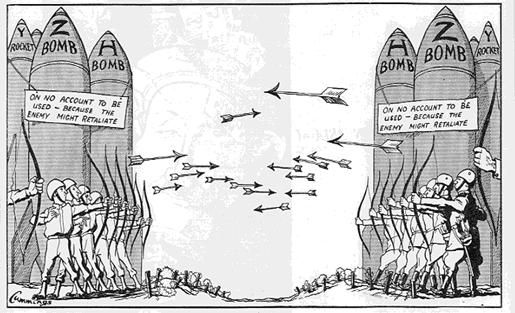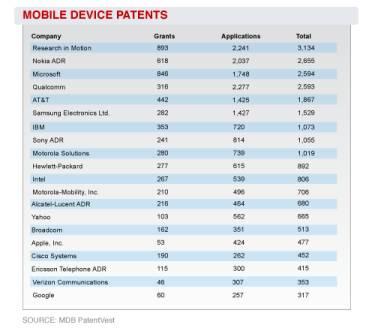
Google Buys Motorola
What does this mean for developers?
by Mark Taoilinn
I’m sure you've heard by now that Google has announced its intention to purchase Motorola Mobility for $12.5BN in cash. What was the motivation behind such a large acquisition, and what does it mean for developers?
In their official press release, Google said “The acquisition of Motorola Mobility, a dedicated Android partner, will enable Google to supercharge the Android ecosystem and will enhance competition in mobile computing. Motorola Mobility will remain a licensee of Android and Android will remain open. Google will run Motorola Mobility as a separate business.”

Patents
Prior to this deal, the Android platform had a weak patent portfolio, ranking only at number 20 in the list of mobile device patents holders (outlined below); well below its two main competitors, Apple and Microsoft. Earlier this month, David Drummond, Senior Vice President and Chief Legal Officer at Google criticized these competitors for running “a hostile, organized campaign against Android by Microsoft, Oracle, Apple and other companies, waged through bogus patents.” He went on to outline how Microsoft are demanding a $15 license fee for every Android phone produced and are suing Barnes & Noble, HTC, Samsung and Motorola to get it. These so called ‘patent taxes’ have the potential to make the free, open source Android platform more expensive to license than Windows Phone 7.

This means war and to survive Android needed to arm itself, and fast. The Motorola deal, the biggest ever for Google, is meant to give Google the ammunition it needs: 14,600 granted patents as well as 6,700 pending patent applications worldwide. On the new, more level playing field, Google will be hoping that this stock piling of armaments can lead to a cold war style stand-off where each side has too much to lose to impose ‘patent taxes’ on each other.
Ultimately a stronger patent portfolio will help Google defend the 39 OEMs (Original Equipment Manufacturers) making Android devices from potential ‘patent taxes’ as well as insulating suppliers from any fall out. Google will be hoping that it will ensure the longevity of the platform.
Core Competencies and Product Control
Motorola has a strong pedigree in the mobile market; Dr. Martin Cooper, a researcher at Motorola, is credited with making the world’s first analogue mobile phone call and the company released the first ever commercial hand held cellular phone. They were one of the founding members of the open handset alliance in 2007, a group of 84 technology companies, including Google, who went on to develop the Android platform. Motorola committed to Android only mobile devices in 2008 and since then have gone to become one of the top 3 distributors of Android devices, along with Samsung and HTC.
When asked in a recent conference call to investors how Google will ensure that Android will remain an even playing field for all OEMs the company were quick to state that they will be running Motorola Mobility as an entirely separate concern. They are keen to assure us that Motorola will rank no higher than any other Android partner (HTC or Samsung for example) and that Motorola will not get any preferential treatment.
I have to agree with Steve Levy, Senior Writer for Wired and author of "In The Plex: How Google Thinks, Works, And Shapes Our World” who was quoted in Business Insider asking the question “Why would you buy something if you intend leaving it alone?”. In purchasing Motorola Mobility Google have acquired a competency that is well outside their core advertising business. Motorola’s skills, infrastructure and experience span the entire life cycle of mobile devices, from device design to software integration to market delivery and have the potential to give Google overall product control to rival that of Apple’s tight control over the iPhone and iPad. There has to be a temptation for Google to consider adopting a new standard – the Motorola standard – as the De facto norm for Android devices.
A single standard or specification set would be great news for developers struggling with the fragmentation issue of having so many different Android devices and manufacturers. And it would be terrible news for the likes of Samsung and HTC who have committed so much to making and marketing their own Android devices.
Breaking new ground
This acquisition wasn’t just to protect the existing manufacturers or to “supercharge” the current ecosystem. Andy Rubin, Senior Vice President of Mobile at Google has also stated that the deal “will enable us to break new ground for the Android ecosystem.” The new ground he is speaking of is the home media, video solutions and TV market . “Our Home business is uniquely positioned to capitalize on the convergence of mobile and home environments” says Sanjay Jha, Motorola Mobility CEO (who, incidentally, is poised to make $90M from the acquisition).
With this acquisition Google is now one of the world’s biggest set-top box makers. “Google TV has not caught on yet, and this could be the wedge to get it (a browser for the TV with a big search button) in millions of living rooms” says Saul Hansell in techcrunch. This would of course open another advertising route for Google and may lead to potential app making possibilities for developers.
What are your thoughts?
The deal is still to be approved but all indications are that the acquisition will go ahead at the end 2011 or the beginning of 2012. Will the new patent portfolio insulate Google from potential patent taxes, or will it lead to an escalation in the patent wars where Microsoft or Apple simply acquire an even bigger portfolio from one of the few sources still available? Will Microsoft feel pressured to commit even further to Nokia by buying the whole company, as many are already speculating they must? And will Google keep the manufacturing arm of Motorola Mobility as an entirely separate venture, will they use it to revive the Google Nexus brand or at least forge a new standard for Android specification, or, will they accept that their core business has nothing to do with hardware and sell off that part of the company? Finally, what might the opportunities be for developers as the Android platform breaks new ground?
We want to hear what you think. Get involved in the discussion on our facebook page.
|
About the Author
Mark Taoilinn is Sales and Marketing Manager for RunRev Ltd.
|
| 


 Tweet
Tweet